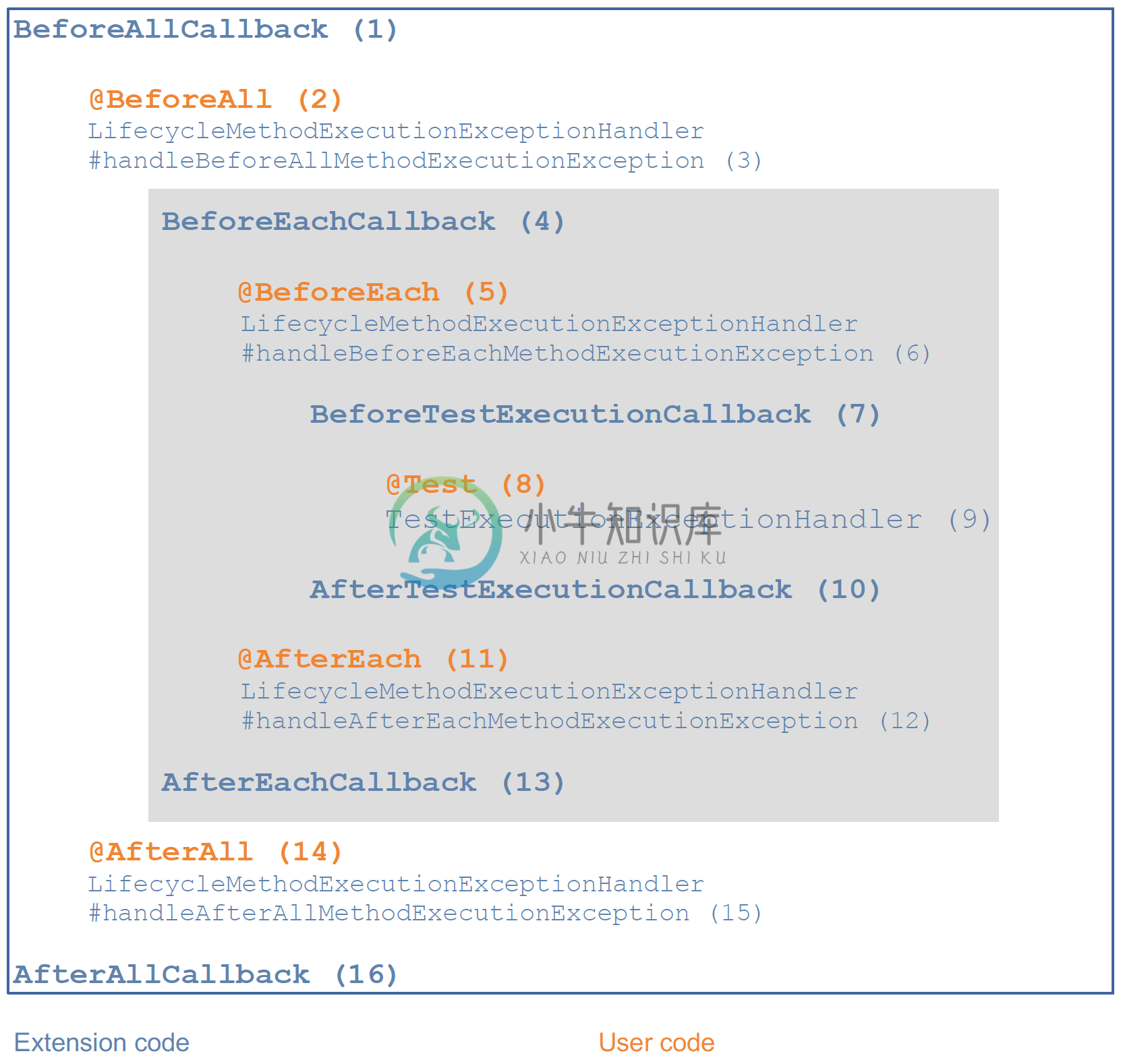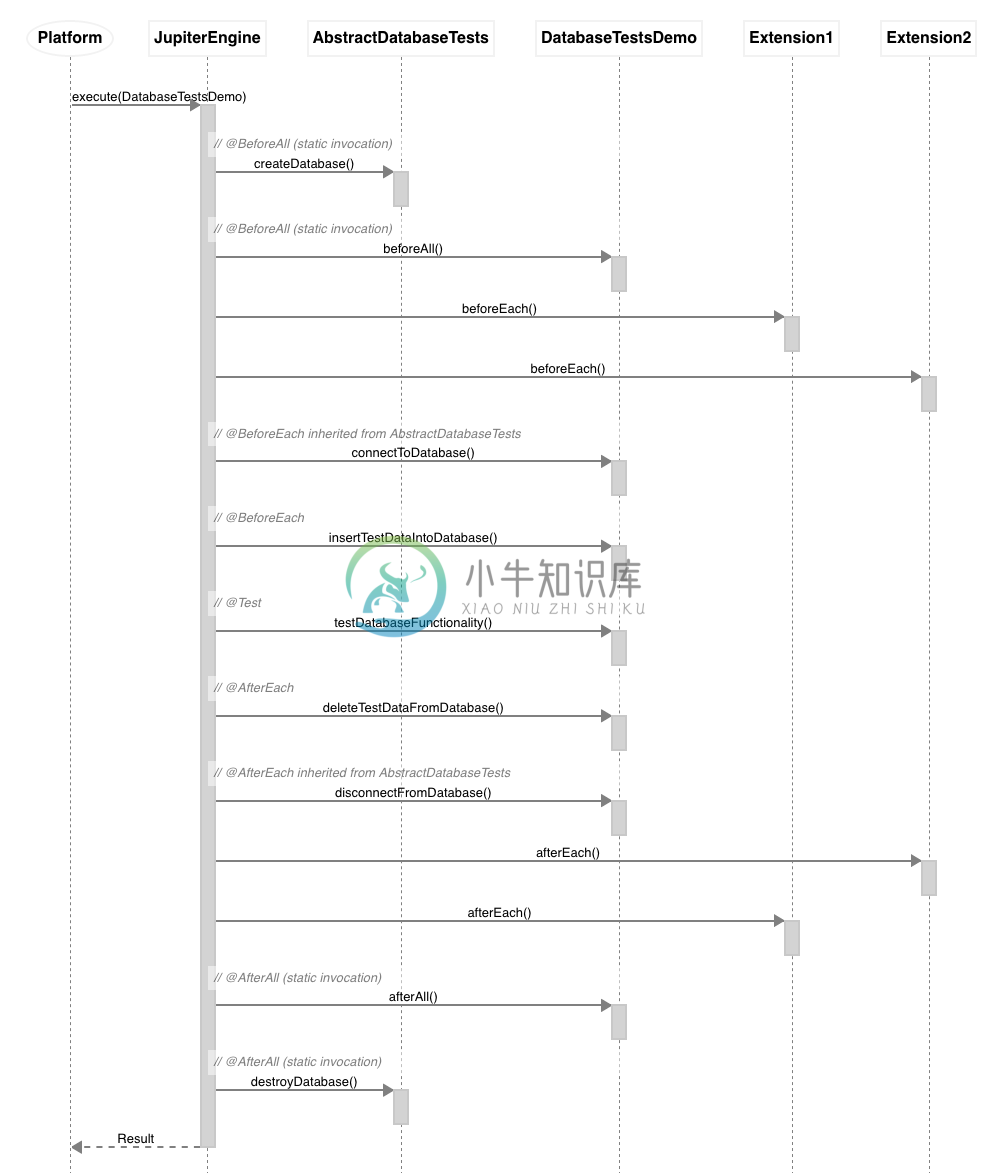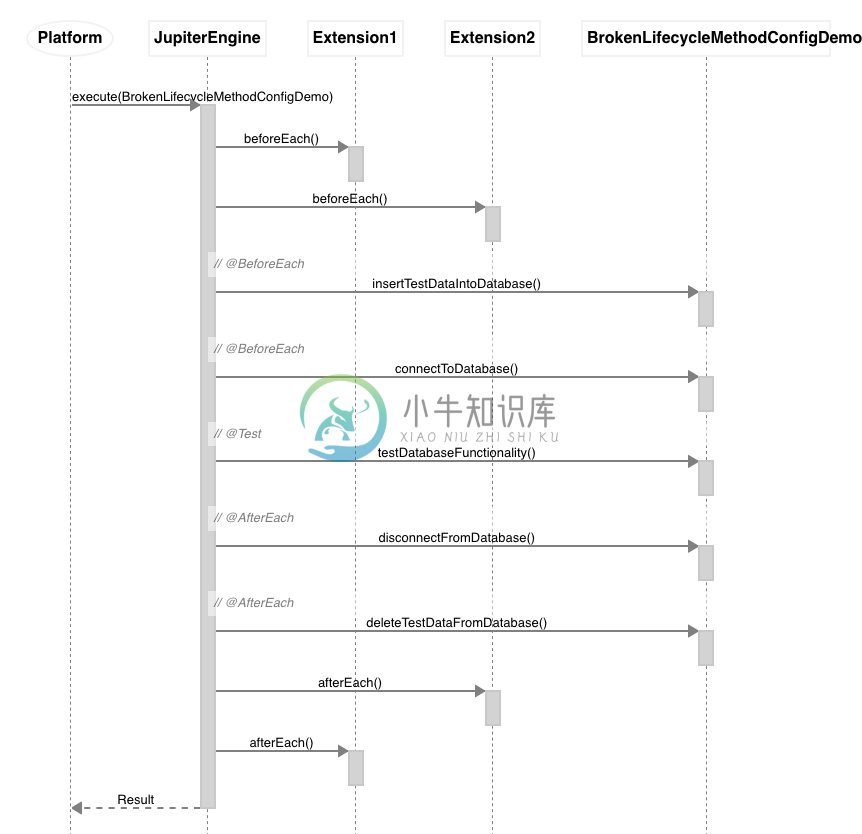1.2.5.10 用户代码和扩展的相对执行顺序
When executing a test class that contains one or more test methods, a number of extension callbacks are called in addition to the user-supplied test and lifecycle methods.
See also: Test Execution Order
5.15.1. User and Extension Code
The following diagram illustrates the relative order of user-supplied code and extension code. User-supplied test and lifecycle methods are shown in orange, with callback code implemented by extensions shown in blue. The grey box denotes the execution of a single test method and will be repeated for every test method in the test class.
User code and extension code
The following table further explains the sixteen steps in the User code and extension code diagram.
| Step | Interface/Annotation | Description |
|---|---|---|
1 | interface | extension code executed before all tests of the container are executed |
2 | annotation | user code executed before all tests of the container are executed |
3 | interface | extension code for handling exceptions thrown from |
4 | interface | extension code executed before each test is executed |
5 | annotation | user code executed before each test is executed |
6 | interface | extension code for handling exceptions thrown from |
7 | interface | extension code executed immediately before a test is executed |
8 | annotation | user code of the actual test method |
9 | interface | extension code for handling exceptions thrown during a test |
10 | interface | extension code executed immediately after test execution and its corresponding exception handlers |
11 | annotation | user code executed after each test is executed |
12 | interface | extension code for handling exceptions thrown from |
13 | interface | extension code executed after each test is executed |
14 | annotation | user code executed after all tests of the container are executed |
15 | interface | extension code for handling exceptions thrown from |
16 | interface | extension code executed after all tests of the container are executed |
In the simplest case only the actual test method will be executed (step 8); all other steps are optional depending on the presence of user code or extension support for the corresponding lifecycle callback. For further details on the various lifecycle callbacks please consult the respective Javadoc for each annotation and extension.
All invocations of user code methods in the above table can additionally be intercepted by implementing InvocationInterceptor.
5.15.2. Wrapping Behavior of Callbacks
JUnit Jupiter always guarantees wrapping behavior for multiple registered extensions that implement lifecycle callbacks such as BeforeAllCallback, AfterAllCallback, BeforeEachCallback, AfterEachCallback, BeforeTestExecutionCallback, and AfterTestExecutionCallback.
That means that, given two extensions Extension1 and Extension2 with Extension1 registered before Extension2, any "before" callbacks implemented by Extension1 are guaranteed to execute before any "before" callbacks implemented by Extension2. Similarly, given the two same two extensions registered in the same order, any "after" callbacks implemented by Extension1 are guaranteed to execute after any "after" callbacks implemented by Extension2. Extension1 is therefore said to wrap Extension2.
JUnit Jupiter also guarantees wrapping behavior within class and interface hierarchies for user-supplied lifecycle methods (see Test Classes and Methods).
@BeforeAllmethods are inherited from superclasses as long as they are not hidden or overridden. Furthermore,@BeforeAllmethods from superclasses will be executed before@BeforeAllmethods in subclasses.- Similarly,
@BeforeAllmethods declared in an interface are inherited as long as they are not hidden or overridden, and@BeforeAllmethods from an interface will be executed before@BeforeAllmethods in the class that implements the interface.
- Similarly,
@AfterAllmethods are inherited from superclasses as long as they are not hidden or overridden. Furthermore,@AfterAllmethods from superclasses will be executed after@AfterAllmethods in subclasses.- Similarly,
@AfterAllmethods declared in an interface are inherited as long as they are not hidden or overridden, and@AfterAllmethods from an interface will be executed after@AfterAllmethods in the class that implements the interface.
- Similarly,
@BeforeEachmethods are inherited from superclasses as long as they are not overridden. Furthermore,@BeforeEachmethods from superclasses will be executed before@BeforeEachmethods in subclasses.- Similarly,
@BeforeEachmethods declared as interface default methods are inherited as long as they are not overridden, and@BeforeEachdefault methods will be executed before@BeforeEachmethods in the class that implements the interface.
- Similarly,
@AfterEachmethods are inherited from superclasses as long as they are not overridden. Furthermore,@AfterEachmethods from superclasses will be executed after@AfterEachmethods in subclasses.- Similarly,
@AfterEachmethods declared as interface default methods are inherited as long as they are not overridden, and@AfterEachdefault methods will be executed after@AfterEachmethods in the class that implements the interface.
- Similarly,
The following examples demonstrate this behavior. Please note that the examples do not actually do anything realistic. Instead, they mimic common scenarios for testing interactions with the database. All methods imported statically from the Logger class log contextual information in order to help us better understand the execution order of user-supplied callback methods and callback methods in extensions.
Extension1
import static example.callbacks.Logger.afterEachCallback;
import static example.callbacks.Logger.beforeEachCallback;
import org.junit.jupiter.api.extension.AfterEachCallback;
import org.junit.jupiter.api.extension.BeforeEachCallback;
import org.junit.jupiter.api.extension.ExtensionContext;
public class Extension1 implements BeforeEachCallback, AfterEachCallback {
@Override
public void beforeEach(ExtensionContext context) {
beforeEachCallback(this);
}
@Override
public void afterEach(ExtensionContext context) {
afterEachCallback(this);
}
}Extension2
import static example.callbacks.Logger.afterEachCallback;
import static example.callbacks.Logger.beforeEachCallback;
import org.junit.jupiter.api.extension.AfterEachCallback;
import org.junit.jupiter.api.extension.BeforeEachCallback;
import org.junit.jupiter.api.extension.ExtensionContext;
public class Extension2 implements BeforeEachCallback, AfterEachCallback {
@Override
public void beforeEach(ExtensionContext context) {
beforeEachCallback(this);
}
@Override
public void afterEach(ExtensionContext context) {
afterEachCallback(this);
}
}AbstractDatabaseTests
import static example.callbacks.Logger.afterAllMethod;
import static example.callbacks.Logger.afterEachMethod;
import static example.callbacks.Logger.beforeAllMethod;
import static example.callbacks.Logger.beforeEachMethod;
import org.junit.jupiter.api.AfterAll;
import org.junit.jupiter.api.AfterEach;
import org.junit.jupiter.api.BeforeAll;
import org.junit.jupiter.api.BeforeEach;
/**
* Abstract base class for tests that use the database.
*/
abstract class AbstractDatabaseTests {
@BeforeAll
static void createDatabase() {
beforeAllMethod(AbstractDatabaseTests.class.getSimpleName() + ".createDatabase()");
}
@BeforeEach
void connectToDatabase() {
beforeEachMethod(AbstractDatabaseTests.class.getSimpleName() + ".connectToDatabase()");
}
@AfterEach
void disconnectFromDatabase() {
afterEachMethod(AbstractDatabaseTests.class.getSimpleName() + ".disconnectFromDatabase()");
}
@AfterAll
static void destroyDatabase() {
afterAllMethod(AbstractDatabaseTests.class.getSimpleName() + ".destroyDatabase()");
}
}DatabaseTestsDemo
import static example.callbacks.Logger.afterEachMethod;
import static example.callbacks.Logger.beforeAllMethod;
import static example.callbacks.Logger.beforeEachMethod;
import static example.callbacks.Logger.testMethod;
import org.junit.jupiter.api.AfterAll;
import org.junit.jupiter.api.AfterEach;
import org.junit.jupiter.api.BeforeAll;
import org.junit.jupiter.api.BeforeEach;
import org.junit.jupiter.api.Test;
import org.junit.jupiter.api.extension.ExtendWith;
/**
* Extension of {@link AbstractDatabaseTests} that inserts test data
* into the database (after the database connection has been opened)
* and deletes test data (before the database connection is closed).
*/
@ExtendWith({ Extension1.class, Extension2.class })
class DatabaseTestsDemo extends AbstractDatabaseTests {
@BeforeAll
static void beforeAll() {
beforeAllMethod(DatabaseTestsDemo.class.getSimpleName() + ".beforeAll()");
}
@BeforeEach
void insertTestDataIntoDatabase() {
beforeEachMethod(getClass().getSimpleName() + ".insertTestDataIntoDatabase()");
}
@Test
void testDatabaseFunctionality() {
testMethod(getClass().getSimpleName() + ".testDatabaseFunctionality()");
}
@AfterEach
void deleteTestDataFromDatabase() {
afterEachMethod(getClass().getSimpleName() + ".deleteTestDataFromDatabase()");
}
@AfterAll
static void afterAll() {
beforeAllMethod(DatabaseTestsDemo.class.getSimpleName() + ".afterAll()");
}
}When the DatabaseTestsDemo test class is executed, the following is logged.
@BeforeAll AbstractDatabaseTests.createDatabase()
@BeforeAll DatabaseTestsDemo.beforeAll()
Extension1.beforeEach()
Extension2.beforeEach()
@BeforeEach AbstractDatabaseTests.connectToDatabase()
@BeforeEach DatabaseTestsDemo.insertTestDataIntoDatabase()
@Test DatabaseTestsDemo.testDatabaseFunctionality()
@AfterEach DatabaseTestsDemo.deleteTestDataFromDatabase()
@AfterEach AbstractDatabaseTests.disconnectFromDatabase()
Extension2.afterEach()
Extension1.afterEach()
@BeforeAll DatabaseTestsDemo.afterAll()
@AfterAll AbstractDatabaseTests.destroyDatabase()The following sequence diagram helps to shed further light on what actually goes on within the JupiterTestEngine when the DatabaseTestsDemo test class is executed.
JUnit Jupiter does not guarantee the execution order of multiple lifecycle methods that are declared within a single test class or test interface. It may at times appear that JUnit Jupiter invokes such methods in alphabetical order. However, that is not precisely true. The ordering is analogous to the ordering for @Test methods within a single test class.
Lifecycle methods that are declared within a single test class or test interface will be ordered using an algorithm that is deterministic but intentionally non-obvious. This ensures that subsequent runs of a test suite execute lifecycle methods in the same order, thereby allowing for repeatable builds.
In addition, JUnit Jupiter does not support wrapping behavior for multiple lifecycle methods declared within a single test class or test interface.
The following example demonstrates this behavior. Specifically, the lifecycle method configuration is broken due to the order in which the locally declared lifecycle methods are executed.
- Test data is inserted before the database connection has been opened, which results in a failure to connect to the database.
- The database connection is closed before deleting the test data, which results in a failure to connect to the database.
BrokenLifecycleMethodConfigDemo
import static example.callbacks.Logger.afterEachMethod;
import static example.callbacks.Logger.beforeEachMethod;
import static example.callbacks.Logger.testMethod;
import org.junit.jupiter.api.AfterEach;
import org.junit.jupiter.api.BeforeEach;
import org.junit.jupiter.api.Test;
import org.junit.jupiter.api.extension.ExtendWith;
/**
* Example of "broken" lifecycle method configuration.
*
* <p>Test data is inserted before the database connection has been opened.
*
* <p>Database connection is closed before deleting test data.
*/
@ExtendWith({ Extension1.class, Extension2.class })
class BrokenLifecycleMethodConfigDemo {
@BeforeEach
void connectToDatabase() {
beforeEachMethod(getClass().getSimpleName() + ".connectToDatabase()");
}
@BeforeEach
void insertTestDataIntoDatabase() {
beforeEachMethod(getClass().getSimpleName() + ".insertTestDataIntoDatabase()");
}
@Test
void testDatabaseFunctionality() {
testMethod(getClass().getSimpleName() + ".testDatabaseFunctionality()");
}
@AfterEach
void deleteTestDataFromDatabase() {
afterEachMethod(getClass().getSimpleName() + ".deleteTestDataFromDatabase()");
}
@AfterEach
void disconnectFromDatabase() {
afterEachMethod(getClass().getSimpleName() + ".disconnectFromDatabase()");
}
}When the BrokenLifecycleMethodConfigDemo test class is executed, the following is logged.
Extension1.beforeEach()
Extension2.beforeEach()
@BeforeEach BrokenLifecycleMethodConfigDemo.insertTestDataIntoDatabase()
@BeforeEach BrokenLifecycleMethodConfigDemo.connectToDatabase()
@Test BrokenLifecycleMethodConfigDemo.testDatabaseFunctionality()
@AfterEach BrokenLifecycleMethodConfigDemo.disconnectFromDatabase()
@AfterEach BrokenLifecycleMethodConfigDemo.deleteTestDataFromDatabase()
Extension2.afterEach()
Extension1.afterEach()The following sequence diagram helps to shed further light on what actually goes on within the JupiterTestEngine when the BrokenLifecycleMethodConfigDemo test class is executed.
Due to the aforementioned behavior, the JUnit Team recommends that developers declare at most one of each type of lifecycle method (see Test Classes and Methods) per test class or test interface unless there are no dependencies between such lifecycle methods.




